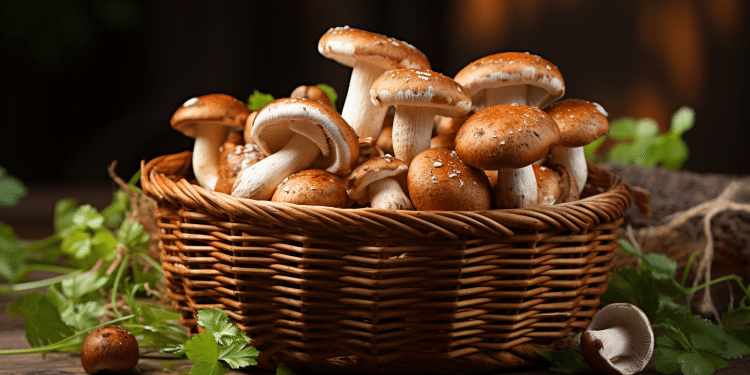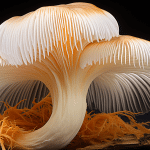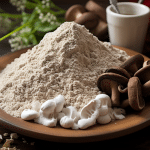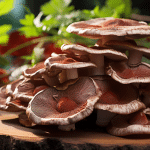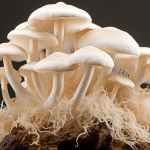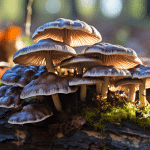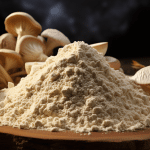In this post we outline some of the most nutritious mushrooms that you can add to your diet with some highlights about each mushroom.
The List of Most Nutritious Mushrooms
Agaricus bisporus
Agaricus bisporus, one of the most commonly eaten mushrooms and the most widely cultivated mushroom in the world, button mushrooms are low in calories and fat, but high in vitamin D. They’re also a good source of protein and potassium.
Chanterelles
Chanterelles are one of my favorite wild mushrooms because they have an earthy, woodsy flavor that pairs well with roasted meats or hearty steak frites like this Fried Chicken With Chanterelle Gravy recipe. These mushrooms are considered a delicacy and can be pricey (upwards of $40 per pound), so look for them at farmers markets or specialty grocery stores if you want to try them out at home!
Oyster Mushrooms
Oyster Mushrooms, are this delicate mushroom has an unusual flavor that makes it perfect for soups (we love this recipe for Oyster Mushroom Soup). It’s also great grilled on skewers with some pineapple chunks—a perfect side dish for a summer barbecue!
Learn more: Mushroom tea benefits
Lentinula edodes (Shiitake mushrooms)
Shiitake mushrooms are also known as lentinula edodes, shii-take and Chinese mushroom. They are available year-round with a peak season from September through November in the United States. They have a firm texture and absorb flavors well.
Shiitake mushrooms are a good source of protein, vitamins B1 and B2, minerals including iron, copper and zinc plus essential amino acids (protein building blocks). These mushrooms contain antioxidants too!
Grifola frondosa (Maitake mushrooms)
Maitake mushrooms are also called “hen of the woods,” and are native to Japan and North America. Physically, they look like very large, wide-brimmed mushrooms with a cap that can grow up to 30 cm long. Like other mushrooms on this list, maitake has a high vitamin D content (more than 2 mg per 100 g), which is important for bone health; it’s also high in B vitamins (nearly 2 times that of kale!) and has been shown to have anti-cancer properties.
Flammulina velutipes (Enokitake)
Also known as velvet foot or enokitake, the Flammulina velutipes mushroom is one of the healthiest mushrooms you can eat. With a thick, meaty texture and an earthy flavor that complements many foods, this mushroom is high in vitamin D (a nutrient we’re not getting enough of), fiber, protein and B vitamins—including riboflavin, niacin and folate. Plus it’s rich in antioxidants like quercetin that help prevent oxidative damage to cells. It’s also high in iron (one cup has more than the USDA daily recommendation for women) and magnesium; potassium; zinc; plus selenium which helps lower your risk for heart disease and cancer.
Pleurotus eryngii (King Oyster)
Pleurotus eryngii mushrooms are also known as King Oyster mushrooms. They’re a great source of protein, vitamins, minerals and fiber.
Pleurotus eryngii is a delicious mushroom that contains vitamins C and A from beta-carotene in their caps. In addition to vitamin C, they contain niacin (vitamin B3), riboflavin (vitamin B2), pantothenic acid (vitamin B5) and the minerals copper and selenium.
The king oyster has excellent health benefits: it’s good for your immune system and helps improve heart health by lowering cholesterol levels!
Learn more: Anti-inflammatory mushrooms
Ganoderma lucidum
Ganoderma lucidum is a medicinal mushroom that tons of people are starting to use. It’s known for being an immune system booster, as well as a liver detoxifier and anti-inflammatory.
Cordyceps militaris
Cordyceps militaris, also known as the caterpillar fungus, is a parasitic fungus that grows on caterpillars, moths and other insects. It is a traditional Chinese medicine that has been used to treat a variety of conditions including diabetes and cancer.
Cordyceps militaris contains antioxidants and anti-inflammatory properties. It also contains cordycepin which may help fight cancer cells as well as boost energy levels in humans. It’s also high in protein so it could be helpful for building muscle mass if you consume enough of them daily!
These mushrooms are low in calories, fat, and sodium, but high in vitamins and minerals–they’re a nutrient-dense addition to a healthy diet.
Mushrooms are low in calories, fat, and sodium. They’re a nutrient-dense addition to a healthy diet. Mushrooms are a good source of protein, fiber, and antioxidants. They’re also rich in B vitamins such as niacin (which helps your body use energy from food) and riboflavin (which helps produce red blood cells).
